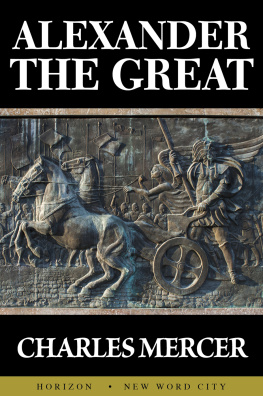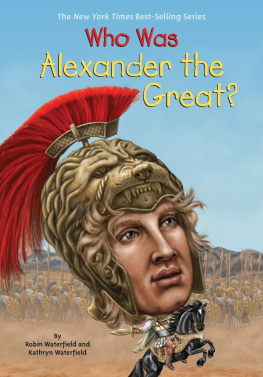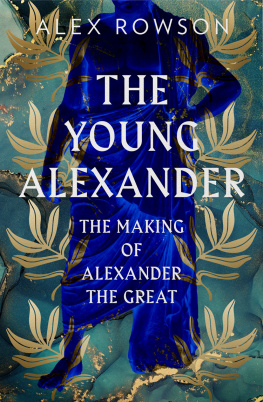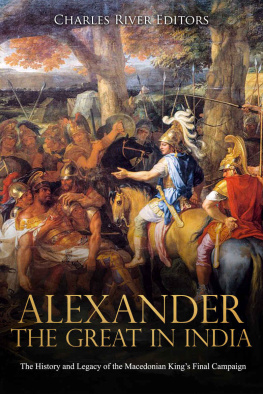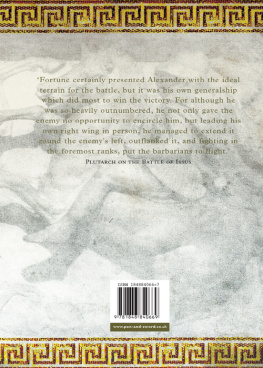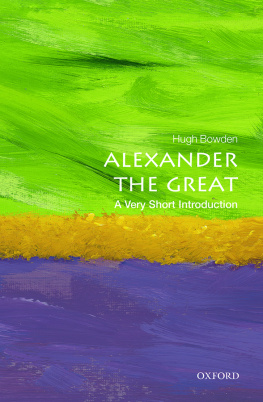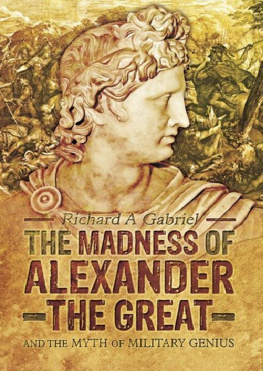Charles Mercer - Alexander the Great
Here you can read online Charles Mercer - Alexander the Great full text of the book (entire story) in english for free. Download pdf and epub, get meaning, cover and reviews about this ebook. year: 2015, publisher: New Word City, Inc., genre: History. Description of the work, (preface) as well as reviews are available. Best literature library LitArk.com created for fans of good reading and offers a wide selection of genres:
Romance novel
Science fiction
Adventure
Detective
Science
History
Home and family
Prose
Art
Politics
Computer
Non-fiction
Religion
Business
Children
Humor
Choose a favorite category and find really read worthwhile books. Enjoy immersion in the world of imagination, feel the emotions of the characters or learn something new for yourself, make an fascinating discovery.
- Book:Alexander the Great
- Author:
- Publisher:New Word City, Inc.
- Genre:
- Year:2015
- Rating:3 / 5
- Favourites:Add to favourites
- Your mark:
- 60
- 1
- 2
- 3
- 4
- 5
Alexander the Great: summary, description and annotation
We offer to read an annotation, description, summary or preface (depends on what the author of the book "Alexander the Great" wrote himself). If you haven't found the necessary information about the book — write in the comments, we will try to find it.
Alexander the Great has fascinated people for centuries - and still does. Here, from award-winning historian and journalist Charles Mercer, is the story of the military genius who became a king at twenty told with all the color and drama characteristic of Alexanders time.
Alexander the Great — read online for free the complete book (whole text) full work
Below is the text of the book, divided by pages. System saving the place of the last page read, allows you to conveniently read the book "Alexander the Great" online for free, without having to search again every time where you left off. Put a bookmark, and you can go to the page where you finished reading at any time.
Font size:
Interval:
Bookmark:
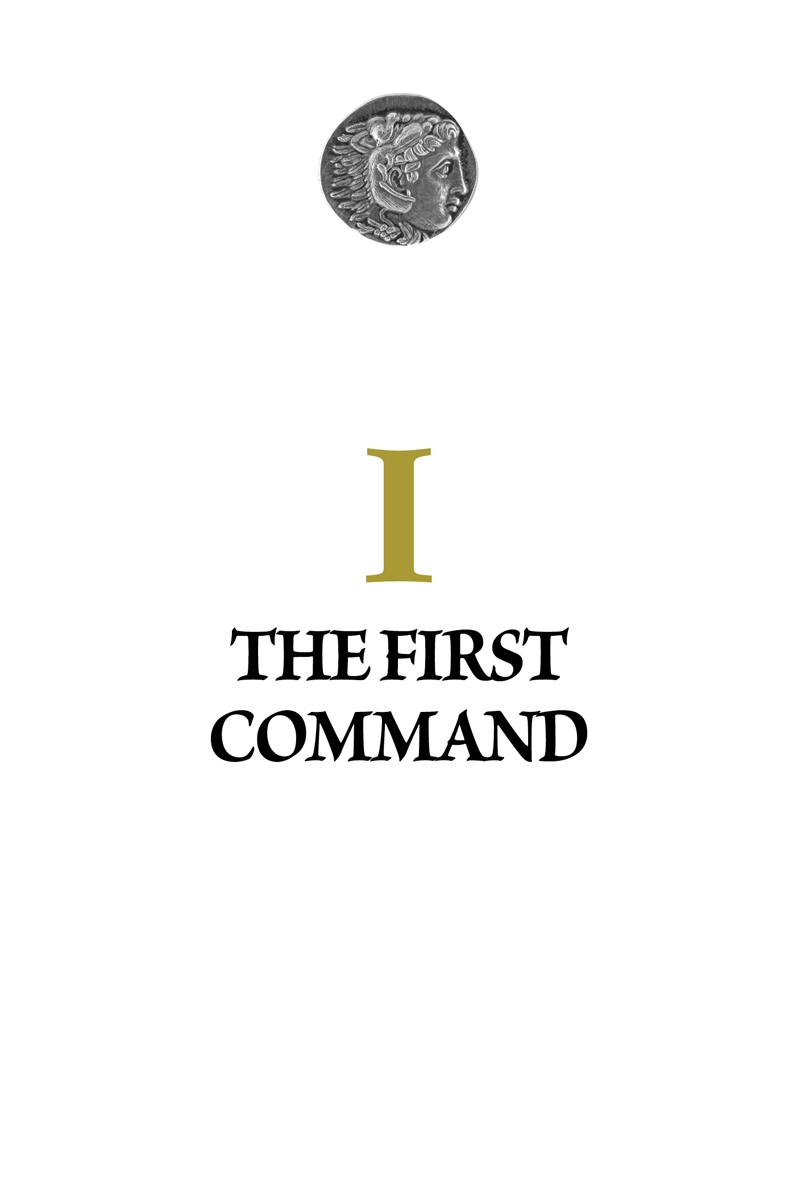
In the summer of 388 B.C., King Philip II of Macedon led his massive army south into the heart of neighboring Greece. From the time he had become king, Philip had been expanding his holdings, overpowering the Greek city-states one by one. Nearly all of Greece was his now; Athens and Thebes were the most vulnerable cities that still remained outside his dominion, but he felt certain that they would also fall. There were good reasons for him to be confident: He was the strongest monarch on the Balkan Peninsula, and his soldiers composed the fiercest and best-trained army that had ever been assembled. He had turned a horde of undisciplined Macedonian peasants - farmers and cattle breeders - into a brilliantly coordinated fighting machine.
On a dusty plain near the village of Chaeronea in central Greece, he halted his soldiers. It was here they would fight their most important battle - against the combined armies of Athens and Thebes, together with allies from nearby Thessaly. Night came, and the Macedonian camp was a scene of clamorous activity as the men prepared for battle. Above the neighing of horses and the harsh shouts of command, there rose a strange, persistent chirping, like that of a thousand crickets, as swords and spear tips were honed to razor sharpness. The men slept, but only briefly, for they were awakened long before dawn. They prayed to their gods, gulped water to wash down their ration of bread, and moved out to their battle positions.
Probably none of the soldiers looked fiercer than the king himself that morning as he sat tall on his horse - to the right of the Macedonian lines. Few bore so many battle scars as Philip. An old wound made him limp, a broken collarbone still pained him, and one of his eyes had been gouged from its socket. However, he had one good leg. And with his one good eye he could peer into the receding darkness at the army he had trained. With its Thessalian allies, it totalled about 30,000 infantry and 2,000 cavalry . The enemy force was greater by possibly 5,000 men.
As light pierced the sky behind the rocky hills, the Macedonians perceived enemy troops deployed along the mile-wide front. The Athenians were opposite the Macedonian right wing, and the Thebans were on the left. Then, as the rising sun flooded the plain with brightness, a mighty shout rose from the Athenians on Philips front, and they pressed forward with levelled spears. To their surprise, Philip ordered his right wing to withdraw, and the Athenian advance, moving faster and faster, became a full-scale onslaught.
Suddenly the Macedonian left wing went into action. In command was a blond youth mounted on a black stallion. Handsome and strong, he was Philips son Alexander, and he had only recently turned eighteen.
Roaring savagely, Alexanders men charged ahead. When they crashed into the waiting Theban wing, the sound must have been like that of a great steel door slamming shut. Spears shivered on shields as the Thebans stubbornly held their line. Then the Macedonians drew short swords and hewed their way into the Theban ranks. Alexander rode with them, leaning from his charger Bucephalus, his sword flashing tirelessly. The Companions, Macedons select cavalrymen, tried to screen their young prince from the soldiers who flung themselves at him. But he plunged ahead; battle meant nothing less than personal combat to Alexander, even at that age.
Under the pressure of Alexanders charge, the Theban line recoiled and bent back. When the line finally snapped, Alexander wheeled his troops toward the center . Meanwhile, Philip had drawn the Athenians on the right into a trap of low ground. Turning , Philips wing smashed through the enemys extended force, and it, too, retreated toward the center . There the famed Sacred Band of Thebes, fighters sworn to die rather than surrender, still fought bravely.
Yet even the strongest steel of Thebes could not withstand the hammer strokes of Alexander on the left and Philip on the right. Every one of the 300 members of the Sacred Band died fighting. And their Greek allies, who had been in the center , were annihilated.
It was a decisive victory, one that elevated Philip at last as master of all the Greek city-states. The conquest of the Athenians was particularly important, for Athens was esteemed as the cultural center of the world. Philip would try now to bring Athenian artists and scholars into crude Macedon, for he wanted his homeland to be worthy of his new empire. He sent his Theban prisoners into slavery but released all the captured Athenians. He needed the good will of their fellow citizens and the support of their fleet, which constituted the greatest naval power in Greece. So instead of marching into Athens with his victorious army, plundering the city and wreaking destruction, he sent his emissaries there - led by an able general and by his son Alexander.
As the young man rode south from the battlefield on that summer day in 338, he began what was to be a long journey into history. Athens was only the first stop; soon he would look beyond the distant horizons, and all of the known world would be part of his domain.
Over the centuries, Alexander, who came to be called Alexander the Great, has been one of historys most fascinating and controversial men. His life story has been told and retold, yet the true character of the man himself remains a mystery. Dozens of works about him were published by his contemporaries, representing him from different points of view. Only portions of these works exist now, but they were all available in complete form at the close of the first century B.C. They served as the basis of books that five superb historians wrote in the first three centuries after Christ. It is to these men that we owe our knowledge of Alexander: Plutarch of Chaeronea, Arrian of Nicomedia, Diodorus of Sicily, Quintus Curtius of Rome, and Justin (M. Junianus Justinus).
The story of Alexander, however it may be told, begins with Philip, his father, and his mother, Olympias. Philip was a forthright warrior, a practical man with great military and administrative talents - combined with the lustful appetites and passions of his Macedonian ancestors. Queen Olympias was the orphaned daughter of the ruler of the mountain kingdom of Epirus, which lay near the border of present-day Albania. She claimed, however, to be descended from the Greek warrior Achilles, and she worshipped Dionysus, god of fertility and wine and son of the chief god, Zeus.
Her beauty had attracted Philip when he made her his queen, but her domineering nature soon repelled him. And her powers as an enchantress frightened him, for she charmed snakes and engaged in mystical rites that in Philips eyes were disgusting. Also, she was without conscience. Soon after Alexanders birth, in midsummer of 356 B.C., Olympias almost convinced her husband that he had not been the infants father. She insisted that a god was the real parent. This god, she said, was Ammon, or Zeus-Ammon, who had mystic powers of fertility and manifested his presence in shooting stars and thunderbolts.
From the time of his childhood, Olympias instilled in Alexander a fascination with magic, and at an early age, he was taught to perform mystic rites. Perhaps more than anything else, Olympias was intent on making her son as unlike Philip as possible, for she fought in Alexander everything that might have been inherited from or influenced by his father.
Olympias did not seem to realize - or perhaps she did not care - that her husband was an extraordinary military strategist and a shrewd politician who was trying to bring all of Greece under his leadership. With her selfish, waspish temperament, Olympias could only see Philips faults: that he drank too much, was easily angered, careless with money, and continually falling in love with other women.
Font size:
Interval:
Bookmark:
Similar books «Alexander the Great»
Look at similar books to Alexander the Great. We have selected literature similar in name and meaning in the hope of providing readers with more options to find new, interesting, not yet read works.
Discussion, reviews of the book Alexander the Great and just readers' own opinions. Leave your comments, write what you think about the work, its meaning or the main characters. Specify what exactly you liked and what you didn't like, and why you think so.

